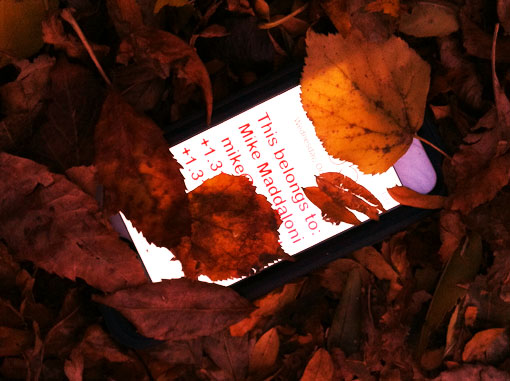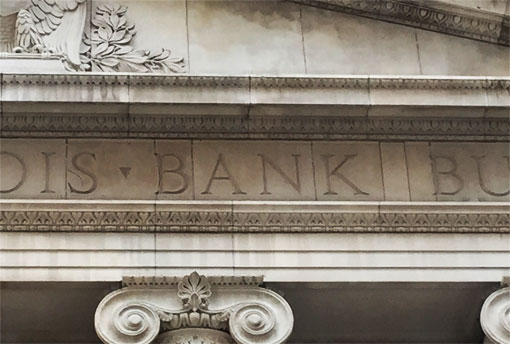Put Your Smartphone Lock Screen To Work To Save Your Device

Whenever someone gets a new or upgraded mobile device, the first thing they do is customize it. From app icon placement to wallpaper images, they do all that they can to make it suit their needs... or ego, or both.
I’d like to share a mobile customization that you can easily do, and it can help you get your device back in case it is ever lost or stolen – customize the lock (or security) screen with your contact information.
It Works!
This idea is actually nothing new for me, as it dates back before I had an iPhone, and even back before I had a Nokia – going back to almost 6 years when I had a Palm 680 smartphone. In those golden years, the lock screen of the Palm allowed you to customize a text message, of which I did with with my name, phone and email address. All was good until one night when I was running late to do the lights and sounds for a friend’s improv show, and in the process of running from the train to the theater, I dropped my Palm device. This I didn’t realize until right before the show started, as I reached to silence a device that was not there. As I had my contact info right there when the kid who found it turned it on, he was able to email me, and we met the next day to get my phone back. Phew!
Create Your Own Image
With today’s popular phones, you can do this with customizing the background image – or wallpaper – on the phone’s lock screen, as you can see that I did on the above photo of my iPhone. In this case, I used PhotoShop, the graphic design software, to create an image to fit on the lock screen, and added the text I wanted. If you don’t have graphic design software, you can still do this a variety of ways, including these tips for the iPhone, Android or Windows Phone. If this is beyond your tech savviness threshold, you can just print out a piece of paper with your info on it, take a picture of it, and save it as the lock screen wallpaper.
But Wait, What About Find My Phone Apps?
Yes Virginia, there are apps and core functionality of devices that allow you to track your device using GPS. And yes, these apps can work to help you retrieve your device. But if someone finds your phone, and when turning it on sees you name, this can be a deterrent to them to whatever nefarious things they may have considered doing to it. Plus they may even get in touch with you prior to you yourself realizing it is missing or can get to a computer to use that find function.
Will You?
Sometimes the simplest solution is the most effective. Your lock screen doesn’t have to be as simple as mine – it can have style, and your contact information as well. If this has convinced you to create a custom lock screen, please let me know in the comments to this post. As well, if you would never consider doing this, I’d like to know that too.
This is from The Hot Iron, a journal on business and technology by Mike Maddaloni.
Did you enjoy this? Subscribe to The Hot Iron by RSS/XML feed or Read by Email.
Build • Mobile Technology • Strategize • Technology • Web Design • (0) Comments • Permalink
If You Love Your Children Get A Domain Name For Their Name

They are little bundles of joy. They are the future. They will probably decide what nursing home we will go into someday. And the odds are good they could become a household name or brand. If not, who is to say what they will need a couple of decades or less after they are born and (hopefully) on their own?
There are a few investments you can make now when the kids are young that will pay off in the future. One is whole life insurance, another is a college savings fund. And another? Registering a domain name or names for their birth name.
I Did and So Should You
Shortly after each of my wonderful little ones were born, and shortly before I contacted relatives and emailed the world, I registered domain names for their birth names. Right in the delivery room.
The decision to get domain names for your kids is smart. It is a low cost (about US$10/year and up, depending on the domain extension) investment in their future. Plus you will never have regrets down the line as nobody else will be able to register their names in the event they suddenly get famous, or decide to focus on their personal brand. The way things are going these days, that may be sooner than later.
I Can Do It and So Can You
Speaking of domain name extensions (a.k.a. what’s after the dot), I recommend starting with the “big 3” of .com, .net and .org, and in that order. If any of those are not available, you may want to try another extension, such as .uno, .co or another short one. You may want to keep away from ones which may not be relevant to them down the road, such as .marketing.
If you’re looking for a great place to register and hold a domain name, go to name.com. I did not make any money by recommending them, but I have had domain names with them for years, and they are the best in my mind – from support to their easy to use, stylish Web site. Plus they offer two-factor authentication, so your domain names are safe.
Have you registered a domain name for your kid? If so, I’d like to hear from you. Or are you against the idea? I’d like to hear from you especially! Please share your thoughts in the comments to this post.
This is from The Hot Iron, a journal on business and technology by Mike Maddaloni.
Did you enjoy this? Subscribe to The Hot Iron by RSS/XML feed or Read by Email.
Domain Names • Strategize • Technology • Thrive • (3) Comments • Permalink
Top 7 Must-Have Features In A New Bank Account

I have always had a love/hate relationship with banks. Love too, you say? Yes, as I worked through most of college at banks, doing everything from check processing to mortgage collections, I gained insight and appreciation for how banks operate. Hate, as most people do, for as consumers we feel banks are not on our side and are just trying to slap fees on us and make it hard to access our money, among other choice topics I am sure.
As I have these negative opinions of my current bank, I have often considered leaving them for someone else. But why?
I decided to write down the features of consumer banking I am looking for. Rather than thinking of the type of bank (or credit union) I'd ideally like to move to, I decided to focus initially on my “pain points” - or the things I think about most often when banking.
So whether you are with a bank and looking for a new account, or a student in a new college town and looking for a local bank, here's what I am considering for my must-haves in a new bank.
- 1. All free – “All” includes checking, savings, ATM usage, foreign ATM usage, online banking, bill pay and cashiers checks, plus no minimum balances. Am I asking for a lot here? No, as bank accounts are the entre into loans with banks, where the real money is made.
- 2. True overdraft protection – As in a credit line, not to a credit card tied to your account. Granted most banks that have overdraft protection have real credit lines, however my current bank does not.
- 3. Non-cheesy online banking and bill pay – I always ask to see a demo, as some online banking is cheesy, especially for smaller banks who use third parties, or like my current one who has a “virtual wallet” metaphor that I never use and is just added clicks to getting to my balance. Oh, and I like to see my check images in online banking as well, especially as I always chose the paperless statements option.
- 4. Bill pay with money coming out of my account right away – This is one of my pet peeves. Where most people like playing the Checkfloat Game, I don't, namely as I lose all the time. If I use bill pay, I want the money out of my account right away.
- 5. ATM accepts cash and checks for deposit – I am hooked on depositing cash into an ATM, the ATM counting it, and crediting it right away.
- 6. Mobile banking with check deposit – Having the ability to not go to a bank or ATM to deposit a check is a wonderful thing.
- 7. Saturday hours – Despite what I said above, there are always the occasions when I need to go to a bank and talk with a human being. As my schedule doesn't always allow me to go during the week, going on a weekend day is a nice feature to have.
When I evaluate a bank, I will simply bring a printout of this blog post with me as my checklist. I would love to have your thoughts as to what features you look for, and feel free to leave them here in the comments to this post. That way they will be on the same printout checklist.
In the meantime, I’ll share this video for the song, “I Hate Banks” by Mojo Nixon and Skid Roper from the 1980’s, which Chicago Cubs fans will especially like. Note it may not be safe to play at work, which of course depends on where you work!
This is from The Hot Iron, a journal on business and technology by Mike Maddaloni.
Did you enjoy this? Subscribe to The Hot Iron by RSS/XML feed or Read by Email.
Business • Strategize • Technology • (0) Comments • Permalink
Retreat Reflect Return

You have certainly heard the expression, “if you can't stand the heat, get out of the kitchen.” Where the idea behind it is that when things are going (or cooking) it can get intense. However I don't think the phrase was to infer you have to spend every waking moment in the thick of it. At least I don't think that.
Early in my career this was something I learned – you need to sometimes get a break from it all – even for a little bit – to be able to keep sharp and focused on the task at hand. Not to forget if you are stuck on something, staring at it all day in itself will not solve it.
Early Lesson Learned
Years ago I was told a story by a manager at the time that really hit home with me, and changed my work habits to include stepping away from it all.
In the story, he was in a distribution center, standing among the racks of palleted merchandise with senior executives of the client. There was a problem and everyone was talking but nobody was really contributing to the situation. In the middle of this, he hopped on a hydraulic scissor lift and went up about 3 levels of the racks. Several minutes later, he lowered the lift and descended, and had the solution to the problem.
Where all of the clients thought he went up on the lift to physically solve the problem, he actually did so to get away! He couldn't think among the bloviating of everybody so he went up the lift, and away from them, to clear his head and logically solve the problem, which he was able to do once free of the clutter. The client was impressed, and in the end had no idea they could have been an impediment to solving the issue at hand.
In short, what he did was retreat, reflect and return.
This is something I have done and continue to do. I touched on this when I wrote how I came up with the name of my Web site assessment checklist. Among some of the ways I have and still do retreat, reflect and return to the workplace include:
Penguins – When I worked in downtown Boston I would go to the New England Aquarium and lean over the railing of the penguin pool at the base of the giant tank. I would stand there and watch the penguins for a while. They have such a simple life, and watching their interactions with each other made for a great way to clear my head.
Plymouth Rock – When I worked in the town where the Pilgrims from England landed in the New World in 1620, I would occasionally go to a sub shop in the center of Plymouth, Massachusetts, across the street from the infamous rock on which the Pilgrims reportedly were first to step on when descending from their ship. I would take my lunch from said sub shop and eat it while leaning over the railing of the shelter which covers the Rock. Staring at the Rock and Plymouth Bay behind it was a great stress reliever.
Modern art – My latest venue is the Museum of Contemporary Art in Chicago, located across the street from my newly-joined workplace. Though said workplace is a great environment to work in and in no way stressful than, say, my last job, it is still nice to recharge my brain a bit on Tuesdays when the museum is free to Illinois residents. I do plan on getting a membership there as I may find the need to think a little differently on another day of the week other than Tuesday.
I am eager to hear if you have any techniques – or destinations – of your own, when you retreat, reflect and return. Please share then in the comments of this post.
This is from The Hot Iron, a journal on business and technology by Mike Maddaloni.
Did you enjoy this? Subscribe to The Hot Iron by RSS/XML feed or Read by Email
Business • Strategize • Technology • Thrive • (0) Comments • PermalinkIt’s OK To Lie On Web And Mobile Security Questions

Your first love. Your first pet. Your first car. And Mom – what was her last name before she got married?
The preceding paragraph was not a trip down memory lane. Rather it is a list of some of the most commonly asked questions on Web sites and mobile apps to verify who you are. Where at one time a simple username and password were enough, now you could be answering one of almost a half-dozen questions and answer pairs to log into an online service. With everyone wanting a higher degree of security, these types of extended login functions are becoming more commonplace.
But I have a secret to share with you. Lie!
When these challenge questions started popping up on online services, I pondered their need, as well as the fact that more personal information about myself would be out there in random databases, and probably not encrypted or secured as well credit card information (or as well as credit card information should be secured!). Though these seem harmless questions, the information can be very personal, yet for some reason we share it.
That’s when I decided to lie – rather than put my Mom’s maiden name on the Web or app form when it is asked, I lied. Instead I put in something different altogether. For ease of remembering, I often use the same answers to similar questions, bit if I am using an online service I may not go back to, I will completely make something up.
The advantage to using a made-up answer to a security challenge question is that should this information get hacked into or otherwise compromised, further personal details of my life are not out there. The disadvantage to this is you will need to remember or log somewhere these questions and answers. Granted there are online secured “wallets” for this type of information, but those too need passwords and perhaps challenge questions and answers too.
Until something better comes along for secured access to online services, username, passwords and challenge question and answer pairs will be prevalent. By using an answer other than the truth, you can feel a little more private. Plus nobody has to know your first pet was a French poodle named Fifi Petunia Marmalade.
This is from The Hot Iron, a journal on business and technology by Mike Maddaloni.
Did you enjoy this? Subscribe to The Hot Iron by RSS/XML feed or Read by Email
Business • Strategize • Technology • Web Design • (0) Comments • Permalink


